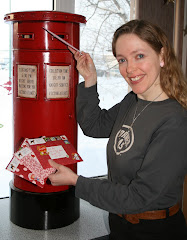This article is slated to appear in the local papers in late January / early February.
By the Reverend Julie Golding Page
Do you remember when steam engines chugged and puffed their way through our region? Although we never lived through the steam era, my husband, Steve, and I were lucky to experience it for ourselves by visiting some historic sites south of the border this summer.
Visiting northern Utah’s Golden Spike National Historic Site took us back in time to a monumental day in 1869, when engines from the Central Pacific and Union Pacific Railways met to connect the Atlantic to the Pacific for the first time.
This new, inter-continental rail link enabled the USA’s settlement of the West, its development into a world power, and even the standardization of time across North America (due to the need for railroad time tables). Even things we now take for granted, such as the ability to send and receive mail from anywhere in a matter of days, can trace their origins to this day. For better or for worse, the rail link was a big step toward today’s highly mobile, interconnected lifestyle.
On the site where the final (golden) spike was driven, there are working replicas of the steam engines that met to witness the feat: Central’s Jupiter and Union Pacific’s #119. We watched as the shiny, colourfully painted engines puffed their way up and down the track, emitting steam and blowing their warning whistles. By climbing up onto a platform next to the track, we were able to get very close to the engines as they passed, with the workers on the engine obviously loving their work and waving as they drove by. We were also treated to an ear-splitting version of the train whistle, as well as to steam clouds that enveloped us as the train went by.
A few days later, in South Dakota’s Black Hills, we had a chance to ride on the 1880 Train, a 19th century steam train, like the ones we had seen at Golden Spike. During the course of the two-hour round trip from Hill City to Keystone, we tried out a couple of different types of vintage rail cars: an open-air car with plain wooden seats, and a closed-in car with upholstered seats and beautiful, green stained glass in the upper windows. In the latter car, we could easily imagine ourselves in Agatha Christie’s Murder on the Orient Express.
As we chugged along through the woods, we often crossed intersections with automobile roads, with the train blowing its whistle each time. Did you know that train whistles mean something, if you listen to their patterns? The warning that an intersection is being approached is made up of four separate whistles: two long, one short, then one long. We learned that this practice, still continued by diesel engines today, dates from the steamboat era. When Queen Victoria was on board, the boat would blow its whistle in this pattern—a “Q” in Morse Code, in honour of the Queen, to warn other boat traffic that the ship would soon intersect their path.
The steam engine puffed hard, spewing clouds of wispy smoke and releasing steam as it carried us through the forest, past 100-year-old mines and buildings that had served the pioneers.
Even though Steve and I had never been part of the steam era, the slow-paced ride on the train gave us a sense of nostalgia for bygone days. It reminded me of stories told by my mother, who grew up in a railway town. The steam engines came through each day, and if there was laundry hanging on the clothesline, the soot from the smoke would blacken it!
Are you curious about the steam era? Northern Utah’s Golden Spike is about a two-day drive from our region. Find out more about it online. For information about the 1880 Train in South Dakota, about a day’s drive from central Saskatchewan, check out this link. All aboard!
Julie and her husband, Steve, share the role of Priest-in-Charge in the Anglican Mission Parish of Hudson Bay & Arborfield. They live in Hudson Bay with their precocious Welsh Terrier, Gryffin. Julie’s interests include travel, writing, penpals, movies, photography, cooking and reading mysteries starring female Anglican priests.
















Interesting to read about nostalgia for a time when "the soot from the smoke would blacken" one's laundry. Oh what wonderful days those must have been; sorry I missed out. :-) My sarcasm is due to the fact that this week I'm reading Kirkpatrick Sale's Rebels against the Future: The Luddites and Their War on the Industrial Revolution. A favorite quote of mine from Thoreau's Walden about the steam train: "when I hear the iron horse make the hills echo with his snort like thunder, shaking the earth with his feet, and breathing fire and smoke from his nostrils...it seems as if the earth had got a race now worthy to inhabit it."
ReplyDelete